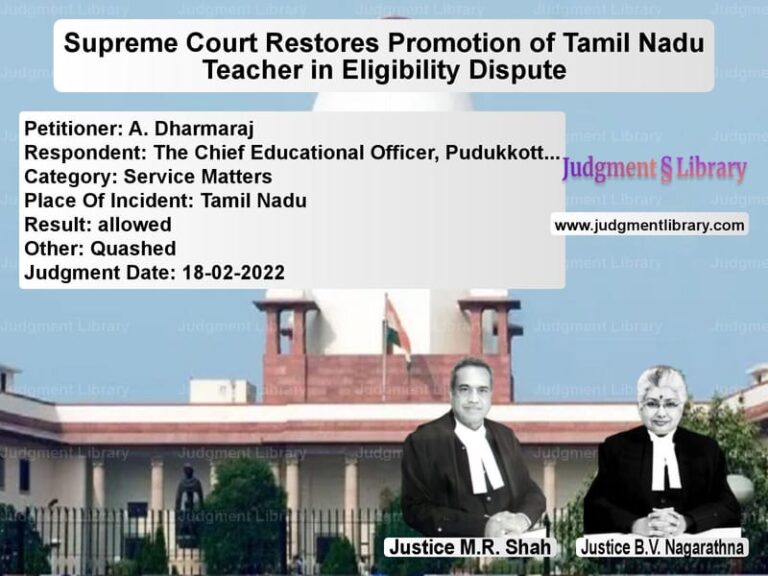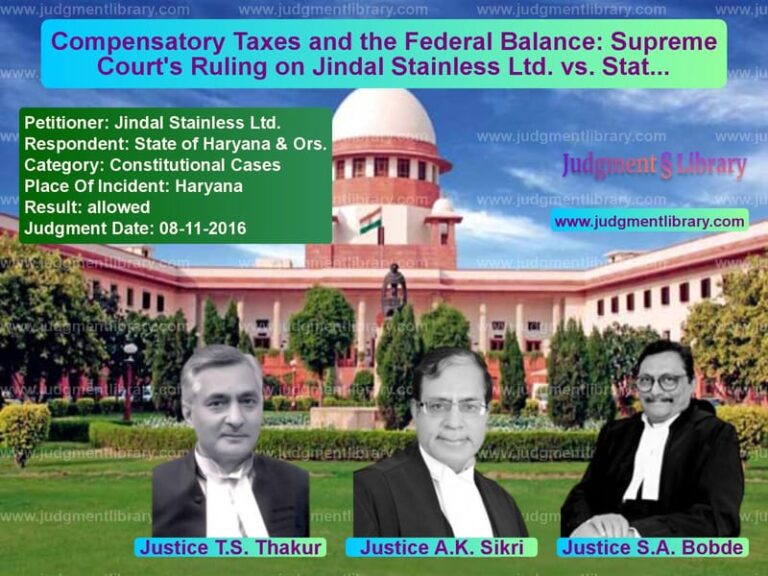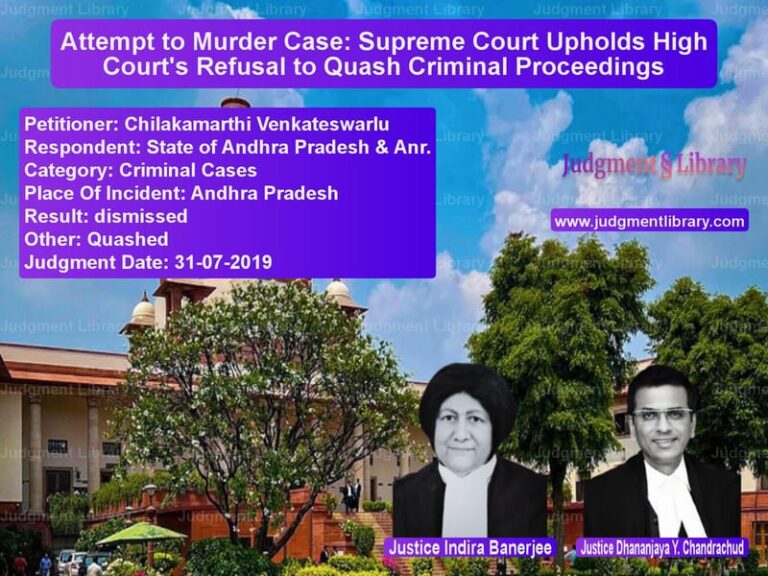Supreme Court Reduces Sentences in Attempted Murder Case: Murali & Rajavelu vs. State
The Supreme Court of India, in the case of Murali & Rajavelu vs. State Represented by the Inspector of Police, partially allowed the appeals against convictions under Sections 307, 324, and 341 of the Indian Penal Code (IPC). The judgment is a significant example of how courts can consider post-conviction settlement between parties while determining sentences, particularly in cases where parties reach an amicable resolution.
Background of the Case
The case arose from an incident on 9th August 2005 in Cuddalore, Tamil Nadu. The appellants, Murali and Rajavelu, along with three other accused, were involved in a violent altercation with the victim, Sathya @ Sathiyajothi, stemming from a dispute during a volleyball match two days earlier. According to the prosecution, Murali struck the victim on the head with a hockey stick, and Rajavelu attacked the victim with a sharp weapon (Veechu Aruval) in an attempt to kill him. The victim managed to block the attack, but in the process, his left hand and parts of his right thumb and fingers were severed.
The appellants were arrested, and a case was registered under Sections 147, 148, 341, 352, 323, 324, 307, and 34 IPC. The trial court convicted Murali under Sections 324 and 341 IPC and sentenced him to three months of rigorous imprisonment, while Rajavelu was convicted under Sections 307 and 341 IPC and sentenced to five years of rigorous imprisonment.
Legal Issues Raised
- Whether the convictions under Sections 324 and 307 IPC were justified.
- Whether the High Court was correct in upholding the sentences awarded by the trial court.
- Whether the post-conviction settlement between the victim and the appellants could be considered for reducing the sentence.
Petitioner’s Arguments
The appellants argued that:
- The incident was a result of a sudden quarrel without premeditation.
- The victim had voluntarily accepted an amicable settlement and had no objection to the reduction of sentences.
- There was no fatal injury, and the prosecution failed to establish intent to kill.
- The appellants had already undergone substantial portions of their sentences.
Respondent’s Arguments
The prosecution contended that:
- The injuries suffered by the victim were serious and could have been fatal.
- The evidence against the appellants, including medical records and the victim’s testimony, was conclusive.
- The compromise between the parties could not nullify the seriousness of the offense.
- The High Court had correctly upheld the trial court’s decision.
Supreme Court’s Observations
The Supreme Court analyzed the circumstances and past judgments, particularly on the issue of compromise in serious, non-compoundable offenses. The Court observed:
“Section 320 of the Criminal Procedure Code (CrPC) does not permit compounding of offenses under Sections 324 and 307 IPC. However, the fact of amicable settlement can be a relevant factor in reducing the sentence.”
The Court also cited Ram Pujan v. State of UP (1973), Ishwar Singh v. State of MP (2008), and Shankar v. State of Maharashtra (2019), where courts had taken into account post-conviction settlements while determining sentences. The Court noted:
“While the offense under Section 307 IPC remains non-compoundable, it is evident that the parties have resolved their differences. The victim has acknowledged the settlement, and the appellants have expressed remorse. Considering these factors, as well as the significant passage of time since the incident, we find it appropriate to reduce the sentences.”
Final Judgment
- The Supreme Court upheld the convictions of the appellants.
- However, it reduced the sentence of Murali to the period already undergone.
- Similarly, the sentence of Rajavelu was also reduced to the period already undergone.
- The appellants were ordered to be released immediately.
- Their bail bonds were discharged.
Implications of the Judgment
This ruling establishes that while serious offenses remain non-compoundable, post-conviction settlements can play a role in sentencing. The judgment also reinforces that courts have the discretion to balance legal principles with social realities in deciding punishments.
Conclusion
The Supreme Court’s decision in Murali & Rajavelu vs. State demonstrates a nuanced approach to criminal sentencing. It highlights the evolving judicial perspective on considering post-conviction settlements in serious offenses while ensuring justice is served in a fair and balanced manner. This case serves as an important precedent for future considerations of compromise and sentencing reductions in criminal appeals.
Petitioner Name: Murali & Rajavelu.Respondent Name: State Represented by the Inspector of Police.Judgment By: Justice N.V. Ramana, Justice Surya Kant, Justice Aniruddha Bose.Place Of Incident: Cuddalore, Tamil Nadu.Judgment Date: 05-01-2021.
Don’t miss out on the full details! Download the complete judgment in PDF format below and gain valuable insights instantly!
Download Judgment: murali-&-rajavelu-vs-state-represented-by-supreme-court-of-india-judgment-dated-05-01-2021.pdf
Direct Downlaod Judgment: Direct downlaod this Judgment
See all petitions in Attempt to Murder Cases
See all petitions in Bail and Anticipatory Bail
See all petitions in Judgment by N.V. Ramana
See all petitions in Judgment by Surya Kant
See all petitions in Judgment by Aniruddha Bose
See all petitions in partially allowed
See all petitions in Modified
See all petitions in supreme court of India judgments January 2021
See all petitions in 2021 judgments
See all posts in Criminal Cases Category
See all allowed petitions in Criminal Cases Category
See all Dismissed petitions in Criminal Cases Category
See all partially allowed petitions in Criminal Cases Category







